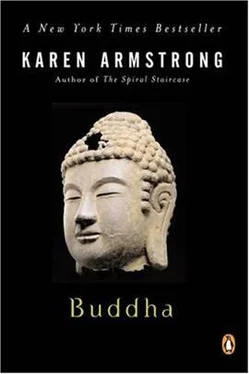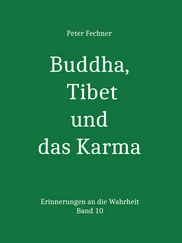The story of Gotama has particular relevance for our own period. We too are living in a period of transition and change, as was North India during the sixth and fifth centuries b.c.e. Like the people of North India, we are finding that the traditional ways of experiencing the sacred and discovering an ultimate meaning in our lives are either difficult or impossible. As a result, a void has been an essential part of the modern experience. Like Gotama, we are living in an age of political violence and have had terrifying glimpses of man’s inhumanity to man. In our society too there are widespread malaise, urban despair and anomie, and we are sometimes fearful of the new world order that is emerging.
Many aspects of the Buddha’s quest will appeal to the modern ethos. His scrupulous empiricism is especially congenial to the pragmatic tenor of our own Western culture, together with his demand for intellectual and personal independence. Those who find the idea of a supernatural God alien will also warm to the Buddha’s refusal to affirm a Supreme Being. He confined his researches to his own human nature and always insisted that his experiences-even the supreme Truth of Nibbana-were entirely natural to humanity. Those who have become weary of the intolerance of some forms of institutional religiosity will also welcome the Buddha’s emphasis on compassion and loving-kindness.
But the Buddha is also a challenge, because he is more radical than most of us. There is a creeping new orthodoxy in modern society that is sometimes called “positive thinking.” At its worst, this habit of optimism allows us to bury our heads in the sand, deny the ubiquity of pain in ourselves and others, and to immure ourselves in a state of deliberate heartlessness to ensure our emotional survival. The Buddha would have had little time for this. In his view, the spiritual life cannot begin until people allow themselves to be invaded by the reality of suffering, realize how fully it permeates our whole experience, and feel the pain of all other beings, even those whom we do not find congenial. It is also true that most of us are not prepared for the degree of the Buddha’s self-abandonment. We know that egotism is a bad thing; we know that all the great world traditions-not just Buddhism-urge us to transcend our selfishness. But when we seek liberation-in either a religious or secular guise-we really want to enhance our own sense of self. A good deal of what passes for religion is often designed to prop up and endorse the ego that the founders of the faith told us to abandon. We assume that a person like the Buddha, who has, apparently, and after a great struggle, vanquished all selfishness, will become inhuman, humorless and grim.
Yet that does not seem to have been true of the Buddha. He may have been impersonal, but the state he achieved inspired an extraordinary emotion in all who met him. The constant, even relentless degree of gentleness, fairness, equanimity, impartiality and serenity acquired by the Buddha touch a chord and resonate with some of our deepest yearnings. People were not repelled by his dispassionate calm, not daunted by his lack of preference for one thing, one person over another. Instead, they were drawn to the Buddha and flocked to him.
When people committed themselves to the regimen that he prescribed for suffering humanity, they said that they “took refuge” with the Buddha. He was a haven of peace in a violent world of clamorous egotism. In one of the most moving stories in the Pali Canon, a king in a state of acute depression took a drive one day through a park filled with huge tropical trees. He dismounted from his carriage and walked among their great roots, which were themselves as tall as an ordinary man, and noticed the way that they “inspired trust and confidence.” “They were quiet; no discordant voices disturbed their peace; they gave out a sense of being apart from the ordinary world, a place where one could take refuge from people” and find a retreat from the cruelties of life. Looking at these wonderful old trees, the king was reminded immediately of the Buddha, jumped into his carriage and drove for miles until he reached the house where the Buddha was staying. The search for a place apart, separate from the world and yet marvelously within it, that is impartial, utterly fair, calm and which fills us with the faith that, against all odds, there is value in our lives, is what many seek in the reality we call “God.” In the person of the Buddha, who had gone beyond the limitations and partialities of selfhood, many people seemed to find it in a human being. The life of the Buddha challenges some of our strongest convictions, but it can also be a beacon. We may not be able to practice the method he prescribed in its entirety, but his example illuminates some of the ways in which we can reach for an enhanced and more truly compassionate humanity.
Note. In quoting from the Buddhist scriptures, I have drawn on the translations made by other scholars. But I have paraphrased them myself and produced my own version to make them more accessible to the Western reader. Some key terms of Buddhism are now commonly used in ordinary English discourse, but we have usually adopted the Sanskrit rather than the Pali forms. For the sake of consistency, I have kept to the Pali, so the reader will find kamma, dhamma and Nibbana, for example, instead of karma, dharma and Nirvana.
one night toward the end of the sixth century b.c.e., a young man called Siddhatta Gotama walked out of his comfortable home in Kapilavatthu in the foothills of the Himalayas and took to the road. We are told that he was twenty-nine years old. His father was one of the leading men of Kapilavatthu and had surrounded Gotama with every pleasure he could desire; he had a wife and a son who was only a few days old, but Gotama had felt no pleasure when the child was born. He had called the little boy Rahula, or “fetter”: the baby, he believed, would shackle him to a way of life that had become abhorrent. He had a yearning for an existence that was “wide open” and as “complete and pure as a polished shell,” but even though his father’s house was elegant and refined, Gotama found it constricting, “crowded” and “dusty.” A miasma of petty tasks and pointless duties sullied everything. Increasingly he had found himself longing for a lifestyle that had nothing to do with domesticity, and which the ascetics of India called “homelessness.” The thick luxuriant forests that fringed the fertile plain of the Ganges river had become the haunt of thousands of men and even a few women who had all shunned their families in order to seek what they called “the holy life” ( brahmacariya ), and Gotama had made up his mind to join them.
It was a romantic decision, but it caused great pain to the people he loved. Gotama’s parents, he recalled later, wept as they watched their cherished son put on the yellow robe that had become the uniform of the ascetics and shave his head and beard. But we are also told that before he left, Sidhatta stole upstairs, took one last look at his sleeping wife and son, and crept away without saying goodbye. It is almost as though he did not trust himself to hold true to his resolve should his wife beg him to stay. And this was the nub of the problem, since, like many of the forest-monks, he was convinced that it was his attachment to things and people which bound him to an existence that seemed mired in pain and sorrow. Some of the monks used to compare this kind of passion and craving for perishable things to a “dust” which weighed the soul down and prevented it from soaring to the pinnacle of the universe. This may have been what Siddhatta meant when he described his home as “dusty.” His father’s house was not dirty, but it was filled with people who pulled at his heart and with objects that he treasured. If he wanted to live in holiness, he had to cut these fetters and break free. Right from the start, Siddhatta Gotama took it for granted that family life was incompatible with the highest forms of spirituality. It was a perception shared not only by the other ascetics of India, but also by Jesus, who would later tell potential disciples that they must leave their wives and children and abandon their aged relatives if they wanted to follow him.
Читать дальше












